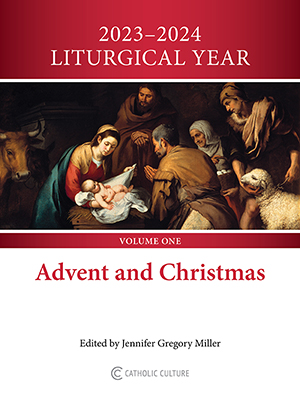The Meaning of Newman’s Grammar of Assent
By Dr. Jeff Mirus ( bio - articles - email ) | Nov 16, 2009 | In Reviews
I’m down to the last few pages of John Henry Cardinal Newman’s An Essay in Aid of a Grammar of Assent. Now that the Vatican is preparing to beatify Newman, and since, as I admitted in July in Newman the Writer, Newman the Saint, my failure to read this work lowers my credibility as a Catholic thinker, I have made it a point to make up for my previous neglect.
A Grammar of Assent is a very serious, prolonged, and deep examination of how the human person (that is, you or I) comes to believe something. The book is not for everyone; in fact there are two reasons for many people to avoid it altogether: first, the prose is difficult; second, the matter is highly analytical. Neither of these are faults of Newman, but both may warn many readers away.
As for the prose, Newman represented the highest genius of the nineteenth century style. His precision, balance and clarity are unmatched, but so are both the length of his sentences and the complex interdependence of his phrases and clauses. A typical sentence in Newman is frequently longer than a whole paragraph of contemporary prose, and a whole paragraph is frequently longer than this entire blog entry. Contemporary style demands shorter sentences, simpler syntax, and briefer paragraphs, which in turn afford greater rest to the eye. You may delight (as I genuinely do delight) in the intellectual and architectonic richness and beauty of Newman’s writing, but if you don’t typically read far outside the modern idiom, it will take a great deal of getting used to.
As for the book’s analytical depth, well, not everyone needs to study this matter in the very great depth with which Newman has set forth his thesis. He himself would be the first to admit that the vast majority of persons evaluate the truth or falsity of a position through an act of judgment, a capacity native to man, which frequently resolves in a few moments what it may take a scholar hundreds of pages of dense prose to explain. Newman, I can assure you, will not be insulted in the least if you have no need of A Grammar of Assent. To the contrary, it is in one sense the whole point of his work to establish that you don’t need it.
But if you have ever been seriously perturbed by assertions, so rightly foreign to your own natural state of mind, that the great questions of human affairs, including religious belief, must be determined, if they are to be determined rightly, through some sort of scientific research or a strictly logical analysis, then you would want very much to read A Grammar of Assent; for in it Newman explains how the human mind proceeds in matters of inference, assent and certitude, and how the faculty of judgment (for Newman, the “illative sense”) ranges over a far greater diversity and quantity of different kinds of evidence than can ever be produced by logic or science, and so brings us through doubt to certainty on the vast majority of human questions, which both logic and experiment are singularly ill-suited to address.
You’ll note, I trust, that the previous paragraph is composed of exactly one sentence—and it may well be a short one by the standards of John Henry Newman. Still, it is to Newman that we owe the profound insight that we become certain of things not through a discursive analysis of all the logical arguments which may be made for and against (for logic, which is so useful with respect to abstractions, offers very little when it comes to facts), but rather through a growing awareness—either over considerable time or in just a few moments—that there is such a convergence of probabilities in favor of the thing under consideration that it must be true. From this convergence of probabilities arises certitude.
Thus the same staggering probability that England is an island, though most persons will never put this to the test, is equally at work in our conviction that Christ is the Son of God, or that the Church speaks with Christ’s own authority. I cannot do justice here to the “grammar” according to which our minds proceed to withhold or grant assent, any more than I can easily explain in a few words the grammar on which my own prose depends—and, surely, the former is far deeper and exceedingly more complex than the latter.
But if you need such an analysis, or if you would find it fascinating to explore it, then you will benefit from A Grammar of Assent. And if not, you will find yourself far more at home with Newman’s poems, sermons, tracts and autobiographical works. For it is axiomatic with Newman that, as a man or a woman, you are (whether you realize it or not, whether you reflect on it or not) already quite at home with the only method we have for arriving at the fundamental truth of most things that really matter: namely, the faculty of human judgment.
All comments are moderated. To lighten our editing burden, only current donors are allowed to Sound Off. If you are a current donor, log in to see the comment form; otherwise please support our work, and Sound Off!









